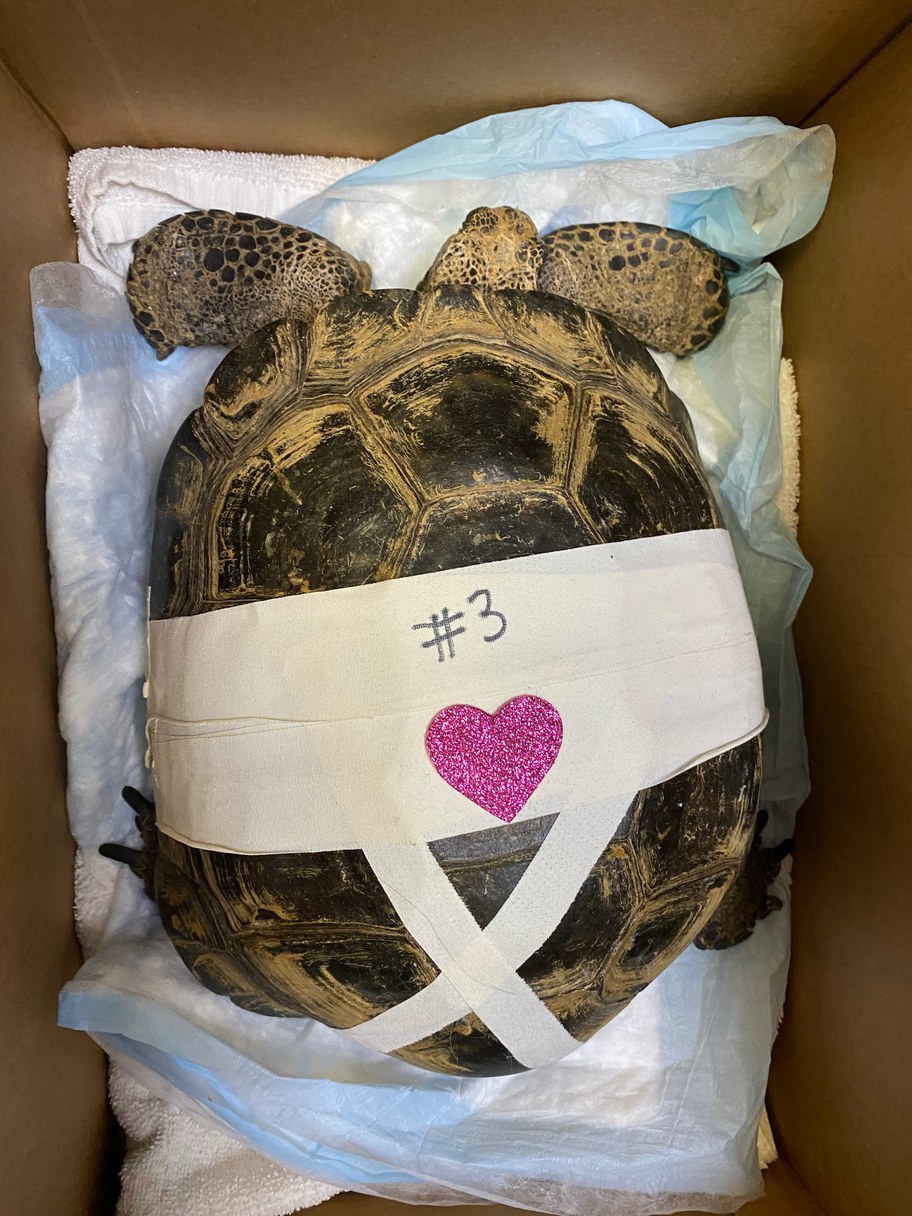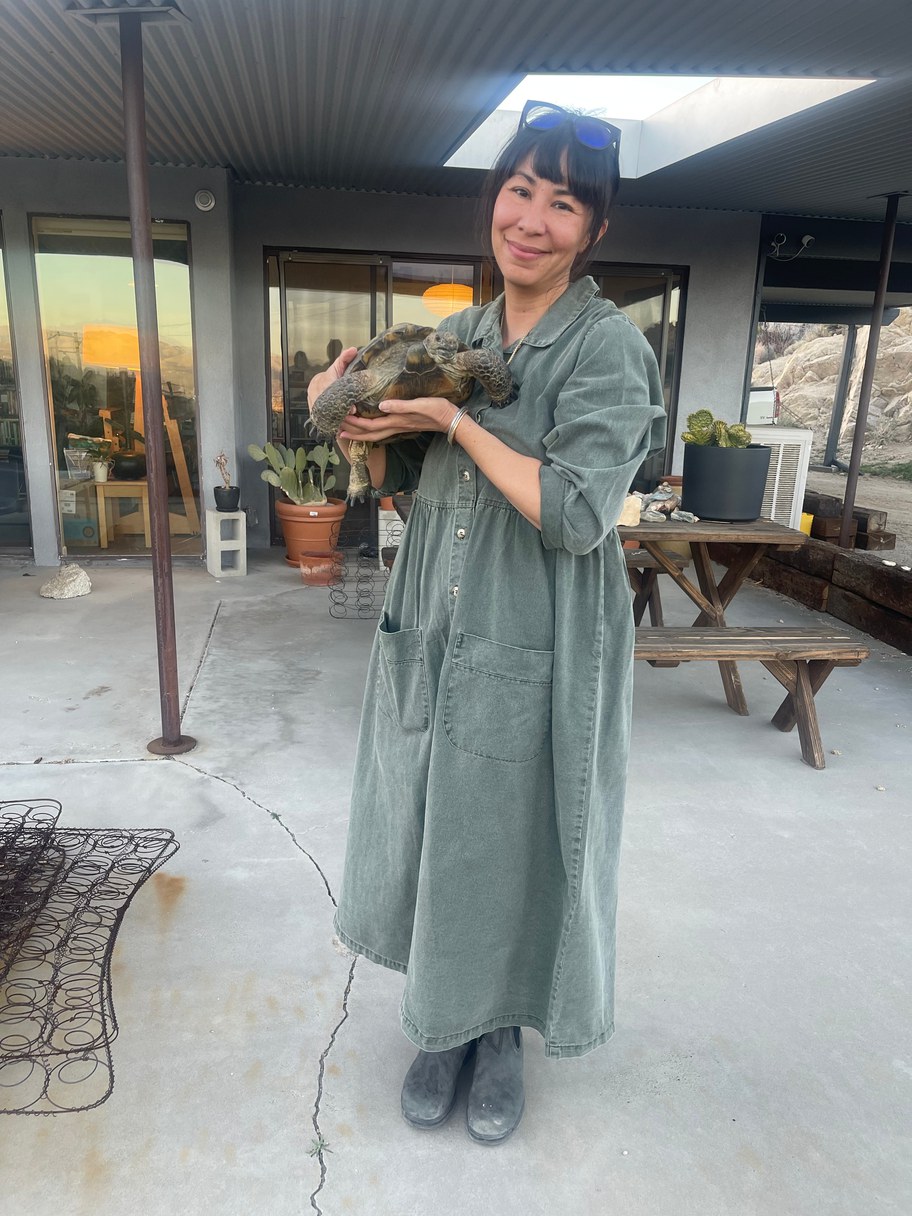Yucca Valley nurse Amy Keeler is not unfamiliar with medical emergencies. But when the tortoise lover visited the Joshua Tree Tortoise Rescue, she was not prepared for what she found.
“Basically, a nightmare,” Keeler says of the condition many of the tortoises were in. “Many dead desert tortoises and a handful of dead, very large Sulcata tortoises … pieces of shell, pieces of bone, buried tortoises, liquefied tortoises.”
Heidi Saunders, the former manager of the Joshua Tree Tortoise Rescue, had been sick for a few years, and passed away from COVID in October 2022. A few months before this, Keeler was approached by a co-worker who was friends with Saunders, to see if she could take care of 100-200 healthy desert tortoises and a dozen or so larger Sulcata tortoises.
Keeler agreed to take them in March 2023, after the tortoises undergo a process called brumation, a form of winter hibernation in which they bury themselves underground until the spring. But in December, Keeler found out from her co-worker that something had gone seriously wrong.
“Heidi's daughter had told her that several [tortoises] were dead on the property and there was a bad smell,” Keeler recounts. “So we made plans to go out … pretty immediately the next day.”

A rescued desert tortoise is marked with a pink heart. Photo courtesy of Amy Keeler.
How the tortoises reached that state isn’t entirely clear, says James Cutchin, reporter for the Desert Sun Newspaper. Heidi Saunders’ illness played a part in their condition, and care of them seems to have fallen to her husband.
“For whatever reason, it doesn't look like he undertook that care,” Cutchin says. “By the time that Amy [Keeler] found them, the state that they were in, there had to have been some neglect going on for some time.”
Soon after, Saunders’ husband took his own life. Amy Keeler’s co-worker speculated the suicide had, in part, something to do with the tortoises, along with the recent passing of his wife.
Keeler managed to rescue 30 tortoises that did survive. Three have since died, and some of the others have been fostered or adopted out to other homes. Keeler is still caring for seven of them at her home. She has also spent a lot of her own money, and vets have spent a lot of time working on the rescued animals, so Keeler has started a GoFundMe page. She says all the tortoises are still dealing with the effects of the neglect.
“They all still have respiratory illnesses. I'm still administering antibiotics and fluids into one, doing dressing changes on a shell that had rotten and gotten infected … they're hanging on. They're not gaining any weight. They were severely underweight. But they are eating. So that's a good sign.”

Amy Keeler stands with a rescued desert tortoise. Photo courtesy of Amy Keeler.
In 2016-2017, California’s Department of Fish and Wildlife had investigated Heidi Saunders following reports of mistreatment of the tortoises. But the case never led to any serious charges. Cutchin says the department and San Bernardino Animal Control visited the Joshua Tree Tortoise Rescue a week after Amy Keeler’s rescue effort in December, and claim they didn’t find evidence of mistreatment. Little further action is expected to be taken, given Heidi Saunders and her husband are now deceased. Keeler is disappointed at how the Rescue was investigated.
“This was a known operation to Fish and Wildlife,” Keeler claims. “It should have been more than enough for them to act and the fact that they haven't is just completely mind-boggling.”
Given the current brumation cycle of the tortoises, there may still be some underground at the Rescue. According to Cutchin of the Desert Sun, Fish and Wildlife claim they are working with Audreanna Saunders, the daughter of Heidi, to find them when spring comes. Keeler says that’s not enough.
“It's just lip service for them to say that, frankly … I spoke to the warden on December 21, last year, and told him that the vet said, if there's anything left alive out there, they've got two weeks tops to survive, they need to be pulled out now. They were all underweight, starved, dehydrated and sick, and there's no way that they would last till spring.”
